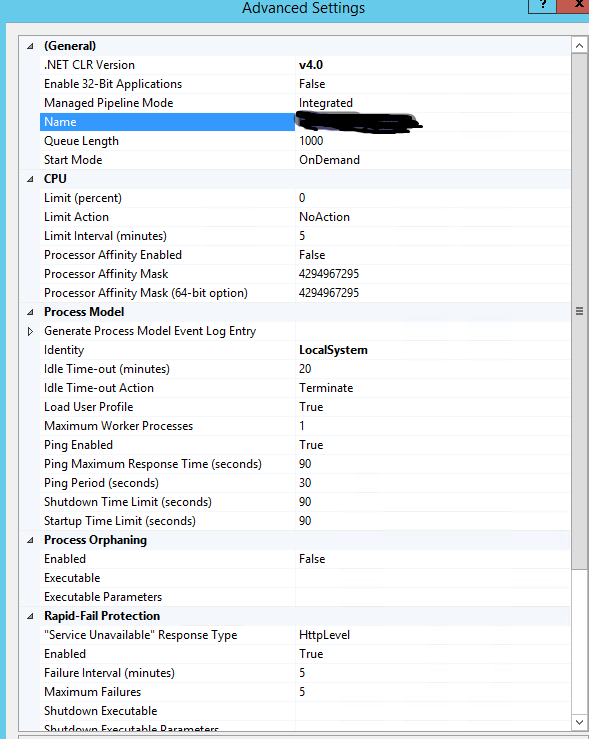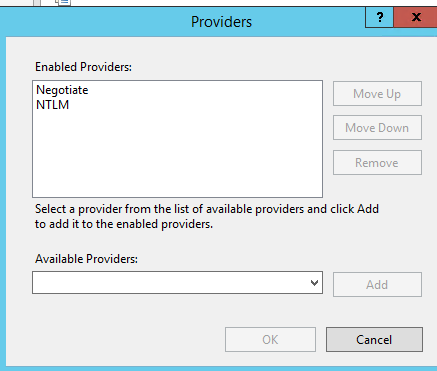Доброго времени суток... Хотя для меня уже третьи сутки голова кругом идет. Итак у нас есть клиент WPF и сервис на IIS.
Конфигурация клиента:
<system.serviceModel>
<bindings>
<basicHttpBinding>
<binding name="TrackingHoursServiceBinding" maxReceivedMessageSize="2147483647" useDefaultWebProxy="False">
<readerQuotas maxDepth="32" maxStringContentLength="20000" maxArrayLength="2147483647"
maxBytesPerRead="4096" maxNameTableCharCount="16384" />
<security mode="TransportCredentialOnly">
<transport clientCredentialType="Ntlm"/>
</security>
</binding>
<binding name="BasicHttpBinding_ITFSService" />
</basicHttpBinding>
</bindings>
<client>
<endpoint address="http://______TrackingHoursService.svc" binding="basicHttpBinding"
bindingConfiguration="TrackingHoursServiceBinding" contract="ITrackingHoursService"
name="WSHttpBinding_ITrackingHoursService">
<identity>
<dns value="localhost" />
</identity>
</endpoint>
<endpoint address="http://_____/TFSService.svc" binding="basicHttpBinding"
bindingConfiguration="BasicHttpBinding_ITFSService" contract="ITFSService" name="BasicHttpBinding_ITFSService" />
</client>
</system.serviceModel>
И сервиса Web.config:
<system.serviceModel>
<protocolMapping>
<add scheme="https" binding="basicHttpBinding" bindingConfiguration="TrackingHoursServiceBinding"/>
</protocolMapping>
<serviceHostingEnvironment multipleSiteBindingsEnabled="true" />
<client />
<bindings>
<basicHttpBinding>
<binding name="TrackingHoursServiceBinding" maxReceivedMessageSize="620000">
<security mode="TransportCredentialOnly">
<transport clientCredentialType="Ntlm" />
</security>
</binding>
<binding name="BasicHttpBinding_IPortableService" maxBufferSize="2147483647" maxReceivedMessageSize="2147483647" receiveTimeout="00:10:00" sendTimeout="00:10:00" />
</basicHttpBinding>
</bindings>
<services>
<service behaviorConfiguration="_.TrackingHoursServiceBehavior" name="_.Service.TrackingHoursService">
<endpoint address="" binding="basicHttpBinding" bindingConfiguration="TrackingHoursServiceBinding" contract="_.Service.ITrackingHoursService">
<identity>
<dns value="localhost" />
</identity>
</endpoint>
<endpoint address="pcl" binding="basicHttpBinding" bindingConfiguration="BasicHttpBinding_IPortableService" contract="_.Service.ITrackingHoursService" />
</service>
</services>
<behaviors>
<serviceBehaviors>
<behavior name="_.TrackingHoursServiceBehavior">
<serviceMetadata httpGetEnabled="true" />
<serviceDebug includeExceptionDetailInFaults="true" />
</behavior>
</serviceBehaviors>
</behaviors>
<extensions>
<!-- In this extension section we are introducing all known service bus extensions. User can remove the ones they don't need. -->
<behaviorExtensions>
<add name="connectionStatusBehavior" type="Microsoft.ServiceBus.Configuration.ConnectionStatusElement, Microsoft.ServiceBus, Culture=neutral, PublicKeyToken=31bf3856ad364e35" />
<add name="transportClientEndpointBehavior" type="Microsoft.ServiceBus.Configuration.TransportClientEndpointBehaviorElement, Microsoft.ServiceBus, Culture=neutral, PublicKeyToken=31bf3856ad364e35" />
<add name="serviceRegistrySettings" type="Microsoft.ServiceBus.Configuration.ServiceRegistrySettingsElement, Microsoft.ServiceBus, Culture=neutral, PublicKeyToken=31bf3856ad364e35" />
</behaviorExtensions>
<bindingElementExtensions>
<add name="netMessagingTransport" type="Microsoft.ServiceBus.Messaging.Configuration.NetMessagingTransportExtensionElement, Microsoft.ServiceBus, Culture=neutral, PublicKeyToken=31bf3856ad364e35" />
<add name="tcpRelayTransport" type="Microsoft.ServiceBus.Configuration.TcpRelayTransportElement, Microsoft.ServiceBus, Culture=neutral, PublicKeyToken=31bf3856ad364e35" />
<add name="httpRelayTransport" type="Microsoft.ServiceBus.Configuration.HttpRelayTransportElement, Microsoft.ServiceBus, Culture=neutral, PublicKeyToken=31bf3856ad364e35" />
<add name="httpsRelayTransport" type="Microsoft.ServiceBus.Configuration.HttpsRelayTransportElement, Microsoft.ServiceBus, Culture=neutral, PublicKeyToken=31bf3856ad364e35" />
<add name="onewayRelayTransport" type="Microsoft.ServiceBus.Configuration.RelayedOnewayTransportElement, Microsoft.ServiceBus, Culture=neutral, PublicKeyToken=31bf3856ad364e35" />
</bindingElementExtensions>
<bindingExtensions>
<add name="basicHttpRelayBinding" type="Microsoft.ServiceBus.Configuration.BasicHttpRelayBindingCollectionElement, Microsoft.ServiceBus, Culture=neutral, PublicKeyToken=31bf3856ad364e35" />
<add name="webHttpRelayBinding" type="Microsoft.ServiceBus.Configuration.WebHttpRelayBindingCollectionElement, Microsoft.ServiceBus, Culture=neutral, PublicKeyToken=31bf3856ad364e35" />
<add name="ws2007HttpRelayBinding" type="Microsoft.ServiceBus.Configuration.WS2007HttpRelayBindingCollectionElement, Microsoft.ServiceBus, Culture=neutral, PublicKeyToken=31bf3856ad364e35" />
<add name="netTcpRelayBinding" type="Microsoft.ServiceBus.Configuration.NetTcpRelayBindingCollectionElement, Microsoft.ServiceBus, Culture=neutral, PublicKeyToken=31bf3856ad364e35" />
<add name="netOnewayRelayBinding" type="Microsoft.ServiceBus.Configuration.NetOnewayRelayBindingCollectionElement, Microsoft.ServiceBus, Culture=neutral, PublicKeyToken=31bf3856ad364e35" />
<add name="netEventRelayBinding" type="Microsoft.ServiceBus.Configuration.NetEventRelayBindingCollectionElement, Microsoft.ServiceBus, Culture=neutral, PublicKeyToken=31bf3856ad364e35" />
<add name="netMessagingBinding" type="Microsoft.ServiceBus.Messaging.Configuration.NetMessagingBindingCollectionElement, Microsoft.ServiceBus, Culture=neutral, PublicKeyToken=31bf3856ad364e35" />
</bindingExtensions>
</extensions>
</system.serviceModel>
На IIS настройки следующие :



На стороне сервиса используя
OperationContext.Current.ServiceSecurityContext.WindowsIdentity.Name
Я могу получить имя пользователя который на даный момент использует WPF. Но мне нужны
ICredentials.
Если я попытаюсь взять их с
System.Net.CredentialCache.DefaultCredentials
System.Net.CredentialCache.DefaultNetworkCredentials
оно всегда возвращает что то типа
Domain\pcName$
Пытался установить их вот так
tcs = new TrackingHoursServiceClient();
tcs.ClientCredentials.Windows.AllowedImpersonationLevel = System.Security.Principal.TokenImpersonationLevel.Impersonation;
tcs.ClientCredentials.Windows.ClientCredential = System.Net.CredentialCache.DefaultNetworkCredentials;
tcs.ChannelFactory.Credentials.Windows.AllowedImpersonationLevel = System.Security.Principal.TokenImpersonationLevel.Impersonation;
tcs.ChannelFactory.Credentials.Windows.ClientCredential = System.Net.CredentialCache.DefaultNetworkCredentials;
Ничего не помогает.... Короче уже 3 дня играюсь .... Как мне передать эти чертовые креденшл на сервис и там из заюзать. мне не нужны не пароль ни имя юзера, а только креденшл что бы создать от его имени(используя его креденшл) tfs клиента и например создать Issue от имени юзера. Кто знает помогите пожалуйста)


